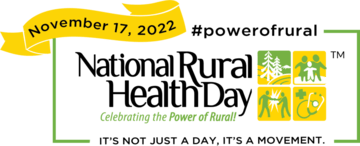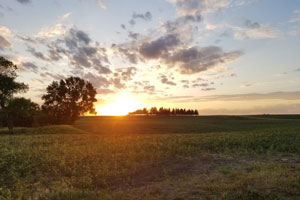National Rural Health Day Spotlight: Health Equity in Rural North Dakota
By Jessica Rosencrans on
Rural America is filled with hidden gems: beautiful countryside, tight-knit communities filled with friendly citizens, and agricultural powerhouses. But, as the saying goes, every rose has its thorns. Amidst the picturesque backdrop, rural communities and their citizens face unique and harrowing challenges. Each year, on the third Thursday of November, a day is set aside to shed light on adversities and celebrate the resilience of rural residents.
 The
National Organization of State Offices of Rural Health
has been celebrating National Rural Health Day since
2011. It is an opportunity to reflect on unique
challenges that rural communities face in the receipt of
healthcare, appreciate local public health and healthcare
workers,
The
National Organization of State Offices of Rural Health
has been celebrating National Rural Health Day since
2011. It is an opportunity to reflect on unique
challenges that rural communities face in the receipt of
healthcare, appreciate local public health and healthcare
workers,
Giving Back to the Community
LaMoure County Public Health Department (LCPHD) is one example of a health facility working to contribute to the wellness of their constituency. After receiving a federal health equity grant, LCPHD asked residents what they felt was lacking in the community.
It became very clear that our issue with health equity is a lack of accessory health services, specifically mental health providers/counselors, optometry, and dental services.
"During our community survey and meeting it became very clear that our issue with health equity is a lack of accessory health services, specifically mental health providers/counselors, optometry, and dental services," Jessica Duffy, a registered nurse administrator at LCPHD said. "At the time, we had one counselor who worked in three counties and no optometry or dental services in the county at all."

LCPHD knew they couldn't solve this issue on their own. They reached out to the Edgeley Job Development Association and the LaMoure Community Development Corporation as local partners, as well as Family HealthCare in Fargo.
"We needed community supporters that could help new businesses financially get started in LaMoure County or a company who would be willing and had the means to bring, share, or hire healthcare professionals to serve our rural area," Duffy said.
Although this project isn't scheduled to be completed until 2024, LCPHD has made large strides in improving health equity across the county. They have successfully connected an optometrist with community funding to support bringing their services to the rural communities in the region. The current focus is locating dental and behavioral health services for the underserved and under-insured population.
Unsurprisingly, an endeavor of this scope takes time and effort. Despite a few bumps in the road, the communities in LaMoure County have been pleased with the results so far.
"The community response to our work in relation to this project has been very positive," Duffy said. "I think that our people will appreciate being able to see an optometrist, dentist, or mental health provider without taking a full day off of work or pulling their kids out of school for the day. Our aging population will appreciate not having to drive long distances to receive needed healthcare."
In addition to this health equity project, LCPHD also participates in programs relating to maternal and child health, tobacco control, prevention of underage drinking, cancer prevention, immunizations and disease control, COVID-19 response, health maintenance, and opioid response. Their facility is an excellent representation of a health-oriented organization that is actively engaged with the community.
Supporting Rural Stakeholders

Holly Long, a project coordinator with the Center for Rural Health (CRH) at the University of North Dakota School of Medicine & Health Sciences, encourages local community members to reflect on the efforts of healthcare facilities in their region.
"National Rural Health Day not only showcases the efforts and innovations of rural healthcare, but also ensures that rural healthcare providers know how valued they are," she said. "We are also motivating North Dakota healthcare facilities to consider implementing a program, whether large or small, that could benefit their community."
We are also motivating North Dakota healthcare facilities to consider implementing a program, whether large or small, that could benefit their community.
Duffy is optimistic that LCPHD efforts could serve as a template for other areas facing a similar problem.
"I think this process could be implemented successfully in other North Dakota communities," she said. "All it takes is small communities coming together to help get these small-town clinics going and then support them by utilizing the services locally."
Celebration Ideas

CRH is offering a variety of other ways to celebrate National Rural Health Day in November. Take part in a photo contest to showcase the beauty of rural North Dakota and the creativity of its residents. Participants are encouraged to submit images to CRH for a chance to win one of four gift cards. Photos submitted for the contest may be featured on the CRH website or on social media.
North Dakota healthcare facilities wanting to raise money for a cause of their choice are encouraged to host a Jeans Day on November 17. CRH will provide stickers free of charge for organizations to hand out to those who wear denim and donate towards the cause.
CRH is also providing a free drawing page for kids to share how they stay healthy. It is available for download on the CRH website. Parents are encouraged to share their child's artwork on social media with the hashtag #powerofrural.
Ultimately, National Rural Health Day serves as an avenue to start the conversation about the importance of rural communities and the implications of what might happen if they are ignored. Rural communities are unique in the fact that all aspects of the community are interconnected. If one part fails, the whole machine dies.
Duffy discusses this concept with regards to LCPHD project.
If we don't support our local businesses, soon we will have to drive an hour for a gallon of milk.
"Having health services locally reduces loss of productive work time for employers, saves on the expense of gas, and supports our other local businesses, like grocery stores, by keeping people in town. If we don't support our local businesses, soon we will have to drive an hour for a gallon of milk."


 is the communication specialist with the Center for Rural
Health at the University of North Dakota School of
Medicine & Health Sciences in Grand Forks.
is the communication specialist with the Center for Rural
Health at the University of North Dakota School of
Medicine & Health Sciences in Grand Forks.



